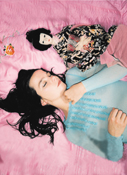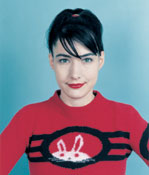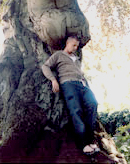 |
  |
 |
  |
 |
 |
| |

Read Bjork's2001 interview with Juergen Teller from the index archives. |

|
 |

Kathleen Hanna discusses writing and making music in this interview from 2000 with Laurie Weeks. |
|
 |
|
 |
|
|
 |

Isabella Rossellini spoke with Peter Halley in this 1999 interview. |
|
 |
|
|
 |
 |
|
Alexander McQueen's 2003 interview with Bjork. |
|
 |
|
|
 |
|

|
| Stephen Malkmus, 2005
WITH PETE COBUS
PHOTOGRAPHED BY DOUG AITKEN |

Pete Cobus interviewed Stephen Malkmus hours before he played with his band, the Jicks, in Battery Park, NYC in July.
PETE: I guess having a baby in the house changes things.
STEPHEN: Since we had the kid, I haven't been writing much. And we just came off tour, so I'm allowed a little downtime. I wake up early, drink coffee and read the paper, and check the Internet. Take the child for a walk. We get a babysitter three times a week, so ostensibly I could work. But really I just go downstairs to my studio and play one-man shows. That sounds totally baby boomer — hanging out down there playing guitar solos. Or maybe more like a teenage stoner.
PETE: Smoke a secret joint...
STEPHEN: Maybe a secret cigarette. And it's the summer, so I play some sports. I play golf. Softball, too, but that's more of Sunday-afternoon social thing.
PETE: What is it with the golf renaissance? All of a sudden it's so popular!
STEPHEN: I've been playing a long time. My dad is really into it, and my cousin, too. During the summer I try to go once a week. It's nice to think about nothing else besides that for a while. Also, I think men secretly like having five free hours to hang out with other guys with no responsibilities. There's an indie-golfer archetype in Portland, which is different from the bourgeois striver. We're just pretty normal guys.
PETE: Are you any good?
STEPHEN: I'm not good. But I shoot below one hundred, which means I'm not bad. Yeah, we keep it athletic here. We go to yoga, too. You know, healthy body, healthy mind. And it's better than going to the gym. Exercise machines and all that. I know the gym's part of the whole self-improvement thing, but there's something weird about it.
PETE: Are you a fan of self-help? Some of the lyrics on your latest album, Face the Truth...
STEPHEN: There's a lot of self-help therapy-speak stuff on there. I haven't been to a therapist, but I'm intrigued by the terms. I like their universality and their slight ambiguity. In a rock song those words sound not so much cynical but not completely personal either.
PETE: Do you buy into the opinion that you're America's most literary lyricist?
STEPHEN: Not really. I'm more, like, rock literate. Writing lyrics is sort of improvisational. It's about capturing a feeling. I can't imagine that someone could write even a poem in as little time as it sometimes takes to write great lyrics.
PETE: Do you sit down and make yourself write?
STEPHEN:I just wait for things to come. I think it's just about looking at the page. Getting things misunderstood in your mind. That's how I like to do it — the brain slurring, words bouncing. It's these weird John Ashbery, Wallace Stevens moments — things sort of cracking and breaking. I like that woozy, psychedelic poetry style — a couple of words that go together in a weird way. Yin-yang, black and white — that's usually the way it works. That's why so many album titles are two words. I just try to put myself in a place to catch all the good things. I listen to a lot of records, read books, and just try to be there.
PETE:What are you reading at the moment?
STEPHEN: At our house we get, uh... Mothering magazine. [laughs] We get this Buddhist thing, Tricycle, the New York Review of Books — I get a lot of ideas from there — the New York Observer sometimes. And the New York Post. I like that. I read a lot of books, but I don't know how much I really turn to writers. Going back and rereading books makes me happy. Tristram Shandy — that's always fun to read. And anything by Charles Dickens.
PETE: After making albums for fourteen years, do you care what the reviews say anymore?
STEPHEN: I definitely don't care quite as much as I used to. With time it becomes easier to laugh things off. When you're just starting out, one bad review can make you feel awful. You tell yourself you won't care, but there's a desire for acceptance that almost everyone who does this must have or they wouldn't put anything out. There is some neediness. Then again, you have to think you're pretty damn good to do this — I won't deny that. It takes hubris even to write songs.
PETE: You built a recording studio in the basement of your house, right?
STEPHEN:I built it last January with help from some friends in town — there are a lot of do-it-yourself people around Portland. Building the recording studio was partly a justification for buying this house — I thought I should at least record the new album here. And it's just easier this way. I can go down there and play around or add something to a track.
PETE: Recording the album yourself must have been difficult.
STEPHEN: It's a lot of work just to run a tape machine while playing guitar, to punch it in with your toe and stuff. But I wanted to do it myself. To control your own music is a great thing. In a corny way, the fact that I can do it myself, and it can still sound good, feels empowering. When I get with a producer or engineer, I have more of an all-right-you-decide attitude. But first I have to get to know them, say nice things — and mean things — in order to get to a place where I can be natural about what I want. Sometimes it's just not worth the amount of time it takes, or the stress of having to be mean to somebody.
PETE: I've heard people compare you to Bob Dylan...
STEPHEN:Well, he's a Gemini. So am I. There's a strong line of rock Geminis. Prince, Brian Wilson, Morrissey, Ian Svenonius, Neil Haggerty. There are tons of us. I like Dylan's style, and I'm a fan of a lot of what he did. But I wouldn't want his mantle as far as politics is concerned — he came up at a really unique time. But Dylan's fucking weird. He's off on one. He's touring right now with a band — he's playing in Portland four times this year. What is Bob Dylan doing playing Portland four times alongside Waylon Jennings? And playing piano? He's got an acoustic guitar, too, in case he gets inspired to pick it up. The fans are like, "Maybe he'll play 'Mr. Tambourine Man...'"
PETE: And he never does. He must be sick to death of it. You must get tired of being characterized as the former Pavement front man.
STEPHEN: We put ourselves out there, so I'm not surprised when people do that. I'm fine with my past. You take the bad with the good. If I had been really uptight about it, I would have just called the band the Jicks. But I thought, "Well, people know me from that other band." Stephen Malkmus and the Jicks is more honest than hiding behind a band name. It also gave me some ins, you know, "Oh, that guy. Maybe he's still good." There's a showbiz aspect to music. I understand that.
PETE:Did you feel pressure to prove yourself post-Pavement?
STEPHEN: Not too much, surprisingly. Unless I was too afraid to admit it. I figured I would just continue to do my thing. There's a capitalist, competitive side to me, a drive to achieve or whatever. And there's a part of me that just likes to make beautiful things, which is a nicer way of thinking about it. I've also got that restless West Coast personality. After Pavement, I just thought, "I gotta keep moving."
PETE: Do you miss playing with those guys?
STEPHEN:Pavement was the time of my youth. There were some super characters in that band, so people might think there's a personality vacuum now. But the people I play with today are just as important to me as the Pavement guys. And the relationship I have with this band is more mature — the whole thing feels more adult, you know?
PETE: It seems like everyone in the Jicks also has their own projects going on. John Roen also plays drums in the Decembrists.
STEPHEN: Yeah, everyone's hedging their bets. At this age, you have to. When you have a young band, everyone commits full-on, it's like, "We want to tour the whole world and make some memories." It's not so much about the future as it is about just being there. But once you've done it for a while, you see through that a little bit. Maybe not if you're in a band that's a total democracy — or a supposed democracy — like U2 or Sonic Youth. But there aren't many bands like that. For the most part they're more like corporations — you have a CEO and a hierarchy. Bands are not utopian.
PETE: Do you have any guilt about leaving the Jicks out of some of the tracks on the new album?
STEPHEN: Yeah, I do. I feel like it's a little uncool. It can't feel that good to put three years into a band and then be pushed aside on some of the songs. They're not faceless people in Malkmus's backing band. We have a sound. My attitude was always that those few tracks were a detour.
PETE: So the next album — Jicks or solo?
STEPHEN: I'm going back to the Jicks — if they want to do it. We've got a few new songs. Enough of me already, you know? But I don't know if I can record at home again. I need some variables — a different studio, different instruments — to get me inspired. I have to get new toys, new effects pedals, to make it sound different.
PETE: What have you got lined up next?
STEPHEN: We're doing a tour of Europe in the fall. I want to enjoy Portland a little bit — it's really beautiful in Oregon right now.
PETE: I used to have a cottage on South East Sixty-Ninth and Belmont. We grew corn and tomatoes — the soil around there is this really rich volcanic ash.
STEPHEN: We have a garden, but the soil's not volcanic. We have a volcanic amount of slugs, though. We're trying to kill them. We have to surround them with ash or salt or something. Something really mean.
PETE: And there's always the problem of stuff in the closet getting moldy...
STEPHEN: The baby's diapers were kind of moldy the other day. But I have a Mediterranean-style house. It's dry feeling. The house is trying to be Italy in Portland. A weird mix. Typically there's this Scandinavian, rainy-type architecture here, but there was a big Mediterranean trend in architecture on the West Coast in the 1920s and '30s. Influenced by Hollywood, I reckon. "Maybe Portland can be like L.A.!"
PETE: It seems like you rebelled against your California roots after growing up there.
STEPHEN: Yeah. I lived in New York for a while. New York is an incredible place when you're in your twenties and thirties if you're in the arts. There is an alternative community in Portland, but it's small. In Portland you're going to get left behind by the child bearers, which I'm one of now too.
PETE: You rebelled sonically, too.
STEPHEN: The first Pavement album, Slanted and Enchanted, was pretty much all about the Fall and the Pixies. But then on Crooked Rain, Crooked Rain I tried to bring the West Coast back. Almost all the best music of the 1960s came out of there. L.A. was really ahead of the arc — the Byrds, the hardcore scene. And San Francisco had some great bands like SST. I started to feel like I should embrace that sonically. If we do jams nowadays, they're gonna be West Coast jams, Oregon style. They're not going to be uptight, Velvet Underground drones. We get more noodly and more melodic instead of just being blues based. But there are things about the West Coast that bug me. There is this really stupid leftism out here.
PETE: People preaching to the converted.
STEPHEN: It makes me mad. On September 11, I was at this health-food store on Hawthorne Boulevard called the Daily Grind. It's a ropy kind of place. These young, shiftless hippies hang out there. This one guy was like, "Those workers, man, they deserved it." At first, I wanted to collar him and put him up against a wall and get all Wolfowitzian on his ass. Then I turned into my dad, like, "This guy can hang out and play in his drum circle now, but in forty years he's just going to be a strain on our health-care system. He may be eating health food, but he doesn't know he's still part of the problem."
PETE: It's really scary when you realize you're turning into your parents. But I guess the upshot of getting older is working out what it's all about.
STEPHEN:I don't think I have. But I'm okay with that. I guess it's about finding people you really care about and not putting your ego above everything else. Maybe you get better at that later in life. Right now I feel pretty caught up in a lot of the usual traps — drinking and sex and fantasy football. But I don't mind — that's part of being alive too.
|
|
 |
|
|
 |

©
index magazine
Stephen Malkmus by Doug Aitken, 2005 |
|

©
index magazine
Stephen Malkmus by Doug Aitken, 2005 |
|
 |
|
|
| |
|
 |
 |
|
Copyright © 2008 index Magazine and index Worldwide. All rights reserved.
Site Design: Teddy Blanks. All photos by index photographers: Leeta Harding,
Richard Kern, David Ortega, Ryan McGinley, Terry Richardson, and Juergen Teller |
| |